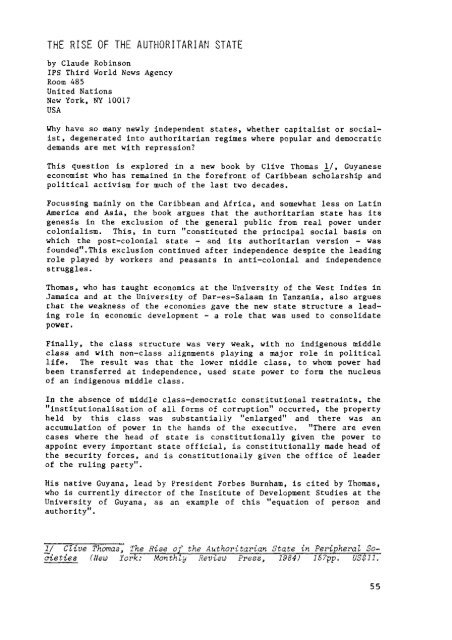Ifda dossier 47, May/June 1985
Ifda dossier 47, May/June 1985
Ifda dossier 47, May/June 1985
You also want an ePaper? Increase the reach of your titles
YUMPU automatically turns print PDFs into web optimized ePapers that Google loves.
THE RISE OF THE AUTHORITARIAN STATE<br />
by Claude Robinson<br />
IPS Third World News Agency<br />
Room 485<br />
United Nations<br />
New York, NY 10017<br />
USA<br />
Why have so many newly independent states, whether capitalist or socialist,<br />
degenerated into authoritarian regimes where popular and democratic<br />
demands are met with repression?<br />
This question is explored in a new book by Clive Thomas I/, Guyanese<br />
economist who has remained in the forefront of Caribbean scholarship and<br />
political activism for much of the last two decades.<br />
Focussing mainly on the Caribbean and Africa, and somewhat less on Latin<br />
America and Asia, the book argues that the authoritarian state has its<br />
genesis in the exclusion of the general public from real power under<br />
colonialism. This, in turn "constituted the principal social basis on<br />
which the post-colonial state - and its authoritarian version - was<br />
foundedW.This exclusion continued after independence despite the leading<br />
role played by workers and peasants in anti-colonial and independence<br />
struggles.<br />
Thomas, who has taught economics at the University of the West Indies in<br />
Jamaica and at the University of Dar-es-Salaam in Tanzania, also argues<br />
that the weakness of the economies gave the new state structure a lead-<br />
ing role in economic development - a role that was used to consolidate<br />
power.<br />
Finally, the class structure was very weak, with no indigenous middle<br />
class and with non-class alignments playing a major role in political<br />
life. The result was that the lower middle class, to whom power had<br />
been transferred at independence, used state power to form the nucleus<br />
of an indigenous middle class.<br />
In the absence of middle class-democratic constitutional restraints, the<br />
"institutionalisation of all forms of corruption" occurred, the property<br />
held by this class was substantially "enlargedu and there was an<br />
accumulation of power in the hands of the executive. "There are even<br />
cases where the head of state is constitutionally given the power to<br />
appoint every important state official, is constitutionally made head of<br />
the security forces, and is constitutionally given the office of leader<br />
of the ruling party".<br />
His native Guyana, lead by President Forbes Burnham, is cited by Thomas,<br />
who is currently director of the Institute of Development Studies at the<br />
University of Guyana, as an example of this "equation of person and<br />
authority".<br />
-<br />
I/ CUve Thomas, The Rise of the Authoritarian State in Peripheral Societiea<br />
(New York: Monthly Revieu Press, 1984) 157pp. US$11.
















